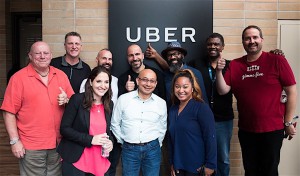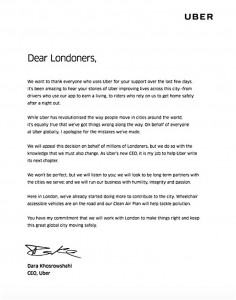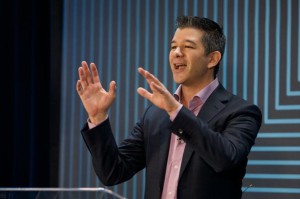
Uber's new CEO Dara Khosrowshahi is already trying to find ways to raise morale and the moral compass of the company.
Uber’s new CEO Dara Khosrowshahi has been on the job less than six weeks and is already facing more crises than the average top executive faces in a career.
He faced his latest biggest hurdle — the revocation of Uber’s license to operate in London — by dealing with it head on: a full-page advertisement apologizing to the city and its residents for not tackling a variety of problems.
“While Uber has revolutionized the way people move in cities around the world, it’s equally true that we’ve got things wrong along the way,” he wrote in a letter first published London’s The Evening Standard. “On behalf of everyone at Uber globally, I apologize for the mistakes we’ve made.”
The move is seen as the first step in turning around the company’s image, but the real question is: Can he step quickly enough to pull the company out of a self-induced freefall that could see it fall behind its competition — or worse.
(London kicks Uber from the curb. For the story, Click Here.)
The apology wasn’t only move aimed at cleaning up the company’s image. He made it clear that he alone could not undo much of what has been done by former CEO Travis Kalanick and other now-departed Uber officials.
In an internal email sent to staff on Friday, which was leaked to the New York Times, Khosrowshahi also told Uber’s workforce: “Going forward, it’s critical that we act with integrity in everything we do, and learn how to be a better partner to every city we operate in.”
The problem with Khosrowshahi’s seemingly heart-felt apology is that Uber’s long history of legal, sexual and other scandals have an equally long collection of apologies from which the ride-sharing company never seemed to learn from.

A copy of the letter from Khosrowshahi to Londoners he sent via Twitter and The Evening Standard newspaper.
Earlier this month, the company apologized after Uber Bangalore sent out a “totally inappropriate” promotional message for “Wife Appreciation Day,” offering users a discount on UberEATS in order to “let your wife take a day off from the kitchen.”
In June, it sent an apologetic email to frequent Uber riders in New York who were using the service less often because of ongoing problems, apologizing for not ensuring that riders and drivers would be taken care of, “we realize that we have fallen short.”
That June Uber apologies were also issued to a woman who was raped in India by her driver in 2014 and whose medical files were handled in appropriately, and by David Bonderman, an Uber board member, apologized for making a sexually suggestive remark to a woman in front of other employees. He issued his “I’m sorry” later that day and resigned the next day.
In May, Uber apologized to the city of Austin, Texas, for pulling its service from the city in a huff over how it conducted background checks. In February, the aforementioned Kalanick said he was sorry for verbally abusing an Uber driver who called him out for Uber’s payment policy, as well as the one prior to that in February when he apologized regarding the Fowler incident in a company-wide email.
The company’s apologized at least four other times during the past two years for a variety of incidents and issues. So, Khosrowshahi’s commitment to “listen to you; we will look to be long-term partners with the cities we serve; and we will run our business with humility, integrity and passion,” may not have the impact he hopes.
(Click Here to see more about Uber facing several criminal probes.)
However, it did get the attention of London’s mayor, Sadiq Khan, who backed the ban instituted by Transport for London. He praised the apology, suggesting it may open the door to talks between the company and city transport officials.
“Obviously I am pleased that he has acknowledged the issues that Uber faces in London,” the mayor said in a statement. “Even though there is a legal process in place, I have asked TfL to make themselves available to meet with him.”
No timetable has been set for the meeting, but it’ll need to take place before Sept. 30, if it is to have any impact. Of course, once they get there, they’ll have to address some of the issues that caused the transportation authority to determine Uber was “not fit and proper to hold a private vehicle hire license.”
The agency’s top issues were Uber’s method for reporting serious criminal offenses, process for driver background checks and its uses of Greyball, a software that can block regulators from gaining complete access to information within the Uber app.

Former Uber CEO Travis Kalanick was forced to resign in the wake of lawsuits, sexual harassment charges and other complaints about the company.
If Khosrowshahi can make things right in London, the return to the states isn’t any more appealing, as he must begin to clean up a string of scandals involving allegations of sexism and bullying at the San Francisco-based start-up that forced out former CEO and co-founder Kalanick in June, including:
- a preliminary investigation by the U.S. Department of justice into the possible violation of bribery laws.
- using Greyball to track and avoid regulators who might try to monitor Uber’s services
- using software to illegally interfere with competitors, such as Lyft, while also causing problems for drivers who wanted to work for both services.
The latter investigation is the latest to focus on Uber’s apparent use of surreptitious software to cause problems for regulators, competitors and its own drivers. Known as “Hell,” the software allowed Uber to create fake accounts to track drivers that worked for Lyft, as well as monitoring what its rival was charging for rides.
(To see more about the problems at Uber that led to Travis Kalanick’s departure, Click Here.)
The FBI is also looking at whether software was also used to encourage drivers to leave Lyft and work exclusively for Uber. And none of this touches on the ongoing lawsuit filed by Waymo alleging a former Uber employee stole proprietary information related to its autonomous vehicle technology.
